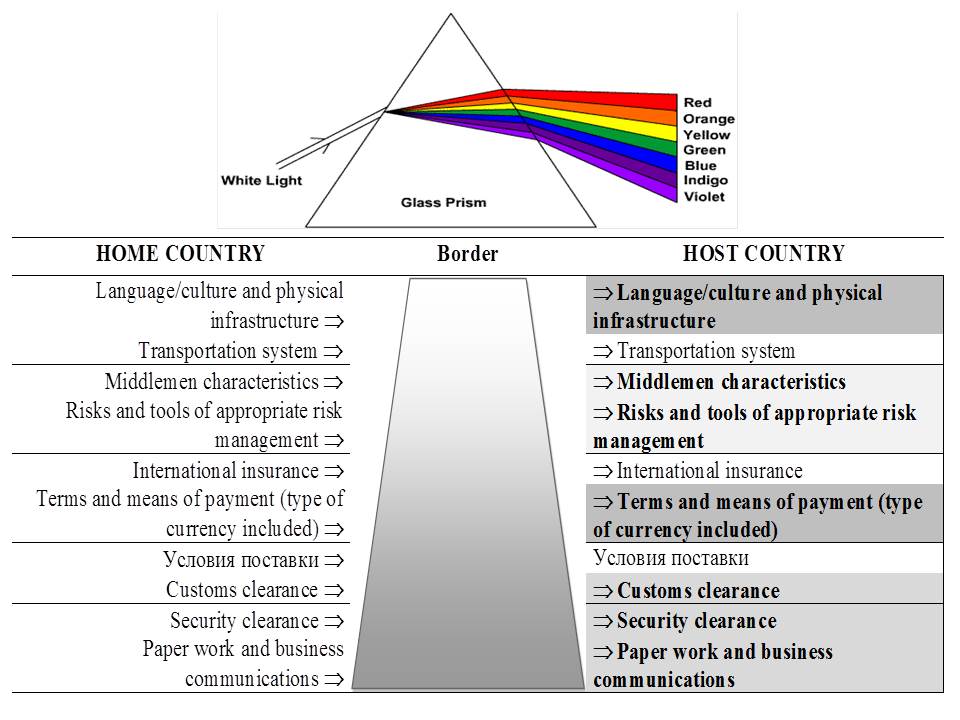Subject of International Logistics
From Supply Chain Management Encyclopedia
| Line 1: | Line 1: | ||
'''Russian: [http://ru.scm.gsom.spbu.ru/Предмет_международной_логистики Предмет международной логистики]''' | '''Russian: [http://ru.scm.gsom.spbu.ru/Предмет_международной_логистики Предмет международной логистики]''' | ||
| - | == ''' | + | |
| + | == '''Starting Points for Defining the Subject of International Logiostics''' == | ||
According to the system engineering theory<ref> Systems Engineering Fundamentals - DAU/DSMC Press - http://ocw.mit.edu/courses/aeronautics-and-astronautics/16-885j-aircraft-systems-engineering-fall-2005/readings/sefguide_01_01.pdf </ref>, international trade is a system with complicated and high great yardstick. Regarding the activity subject of international trade (business) as the whole collection, and the one of the international logistics as the subset, the effect of establishing one's own system exists in the subset, and the international logistics can be regarded as the subsystem of international trade (business), discussed independently. The activity subject in international trades mainly include importers, transnational logistics facilitators, exporters, customs, banks, government's functional departments, insurance companies, credit rating organizations, audit agencies, etc. Among them, the international logistics facilitators are a subject of international logistics activities | According to the system engineering theory<ref> Systems Engineering Fundamentals - DAU/DSMC Press - http://ocw.mit.edu/courses/aeronautics-and-astronautics/16-885j-aircraft-systems-engineering-fall-2005/readings/sefguide_01_01.pdf </ref>, international trade is a system with complicated and high great yardstick. Regarding the activity subject of international trade (business) as the whole collection, and the one of the international logistics as the subset, the effect of establishing one's own system exists in the subset, and the international logistics can be regarded as the subsystem of international trade (business), discussed independently. The activity subject in international trades mainly include importers, transnational logistics facilitators, exporters, customs, banks, government's functional departments, insurance companies, credit rating organizations, audit agencies, etc. Among them, the international logistics facilitators are a subject of international logistics activities | ||
Revision as of 09:35, 13 November 2014
Russian: Предмет международной логистики
Starting Points for Defining the Subject of International Logiostics
According to the system engineering theory[1], international trade is a system with complicated and high great yardstick. Regarding the activity subject of international trade (business) as the whole collection, and the one of the international logistics as the subset, the effect of establishing one's own system exists in the subset, and the international logistics can be regarded as the subsystem of international trade (business), discussed independently. The activity subject in international trades mainly include importers, transnational logistics facilitators, exporters, customs, banks, government's functional departments, insurance companies, credit rating organizations, audit agencies, etc. Among them, the international logistics facilitators are a subject of international logistics activities
In the large geographical range, the main goal of international logistics is international trade and transnational operating service, making the logistics system of various countries joined each other. Compared with local logistics system the main characteristic is summed up as follows[2]:
- Complexity of the hardware environment of international logistics. According to the principle of the wooden barrel, the disappearance/distortion of logistics technical application of some areas/functions (See the model below) will cause the service level of the whole international logistics system to drop. In addition, different logistics technical standards will cause the difficulty of integrating the global supply chain too.
- Complexity of the soft environment of international logistics. Each country has different law, custom, language, social system, natural environment, management method, and production custom etc., the soft environment of logistics made up by these key elements (marketing dimensions or non-controllable variables) demonstrates the diversification will increase the complexity of integrating the global supply chain too.
Prismatic model of emerging a mismatching between the home country logistics mix and host country business/marketing environment while crossing the state border by a subject of international sale contract
LEGEND:
- “White Light” displays a quasi-optimized logistics mix having its components matched with the home country business/marketing environment.
- “Glass Prism” displays impacts of cross-border disruptions or dissimilarities on the home country logistics mix in comparison with a host country logistics mix.
- Angles of declining for different color components of the “White Light” (from “Red” till “Violet”) display degrees of mismatching between the home and host logistics mixes after crossing the state border.
Essay of Defining the Subject of International Logistics
The military genesis of international logistics is a locus communis for corresponding textbooks [3]. A “new logistics” or “business logistics” was initially (1970s) based on the military concept and encompassed mostly the physical movement of goods [4]. Today the “logistics” term is understood much broader and covers not only items of physical movement of goods in space and time[5] (i.e., transportation and storage functions, respectively), both upstream (procurement) activities and downstream (sales) activities, but also the management of the relationships of a focal company with its suppliers and customers (i.e., informational and financial flows included). Defining the subject of logistics in a general sense demands to include such tasks as designing, setting up, operating and optimizing systems, which generate physical goods and immaterial services. Therefore [6], “These tasks overlap with production planning, process technology, industrial engineering, operations research, informatics and other fields of technology and economics”. Besides, “considering logistics in this broadest sense one should to include also purchase and sales” [7]. The latter conforms to the disciplines known as Procurement Logistics [8] and Marketing Logistics[9], respectively.
References
- ↑ Systems Engineering Fundamentals - DAU/DSMC Press - http://ocw.mit.edu/courses/aeronautics-and-astronautics/16-885j-aircraft-systems-engineering-fall-2005/readings/sefguide_01_01.pdf
- ↑ Zhanghanjiang, X. The International Logistics E-Business System Analysis and Design based on Middle Ware Technology - http://www.seiofbluemountain.com/upload/product/201001/1263372659ccobn55q.pdf
- ↑ Wood, D.F., Barone, A.P., Murphy,P.R., and Wardlow, D.L. (2002), International Logistics, AMACOM, a division of American Management Association, New York, etc. –p.1
- ↑ David, P.A., and Stewart, R.D. (2010), International Logistics: The Management of International Trade Operations, Cengage Learning, Maison, USA. – p.35
- ↑ Gudehus, T. and Kotzab, H. (2012), Comprehensive Logistics, Springer-Verlag, Berlin Hei-delberg, Germany. – p.4.
- ↑ ibid
- ↑ ibid
- ↑ Taderera, F. (2010), Principles of International Purchasing: International Procurement, Ship-ping, Logistics, Lambert Academic Publishing, Saarbrücken, Germany.
- ↑ Christopher, M. and Peck, H. (2010) Marketing Logistics (Chartered Institute of Marketing), Butterworth-Heinemann, Amsterdam, etc.





